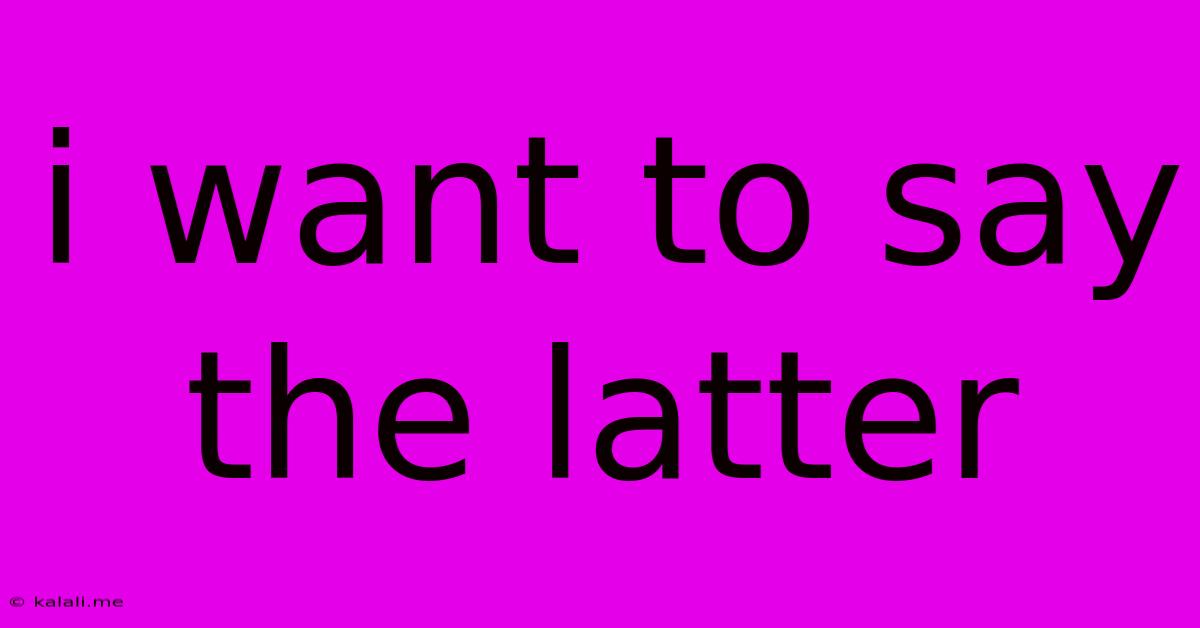I Want To Say The Latter
Kalali
Jun 04, 2025 · 3 min read

Table of Contents
I Want to Say the Latter: Choosing the Right Word and Avoiding Ambiguity
Choosing between two options can be tricky, especially when both seem plausible. This article delves into the meaning and proper usage of "the latter," offering clear examples and guidance on how to use it effectively in your writing to avoid confusion and enhance clarity. This often overlooked phrase can significantly improve your writing's precision and impact.
When faced with two options, A and B, "the latter" refers specifically to B, the second option mentioned. Understanding this simple definition is crucial for mastering its correct application. It's a concise and elegant way to avoid repetition and maintain a smooth flow in your sentences. Mastering its usage demonstrates strong writing skills and attention to detail. This is particularly important in academic, professional, or technical writing where precision and clarity are paramount.
Understanding the Context: "The Former" and "The Latter"
"The former" and "the latter" are always used in pairs, referring back to two previously mentioned items. "The former" refers to the first item mentioned, while "the latter" refers to the second. Let's illustrate with an example:
"I offered her two choices: a trip to Paris or a weekend staycation. She chose the latter."
In this sentence, "the latter" clearly refers to "a weekend staycation," the second option presented. Without "the latter," the sentence would be ambiguous and potentially misleading.
Using "The Latter" Effectively: Examples
Here are more examples demonstrating how to use "the latter" effectively in various contexts:
-
Academic Writing: "Two theories were proposed: the theory of relativity and quantum mechanics. The latter has significantly impacted our understanding of subatomic particles."
-
Professional Communication: "We presented two proposals to the client: a short-term solution and a long-term strategy. The client ultimately opted for the latter."
-
Everyday Conversation: "Should we go to the beach or the mountains? I'd prefer the latter."
Notice in each example, "the latter" concisely and unambiguously identifies the chosen option. It adds precision to the sentence, removing any potential doubt about the writer's intent.
Avoiding Ambiguity: When Not to Use "The Latter"
While "the latter" is a powerful tool, it's crucial to use it correctly to prevent confusion. Avoid using it if:
-
Only one item is mentioned: "The latter" requires at least two previously mentioned items to function correctly. Using it without a preceding pair is grammatically incorrect.
-
The context is unclear: Ensure that the two preceding items are clearly distinct and easily identifiable. If the connection isn't obvious, consider rephrasing to enhance clarity.
-
The sentence becomes overly complex: While concise, overuse can make your writing cumbersome. If the sentence becomes too long or convoluted, consider a simpler approach.
Mastering "The Latter": A Key to Clear Writing
In conclusion, understanding and employing "the latter" correctly is a valuable skill that enhances clarity and precision in your writing. It demonstrates attention to detail and improves the overall impact of your communication. By adhering to these guidelines, you can confidently use "the latter" to avoid ambiguity and elevate your writing to a higher level. It's a small word with a big impact on your writing's effectiveness.
Latest Posts
Latest Posts
-
How Do You Insulate A Crawl Space
Jun 05, 2025
-
What Does Dominion Mean In The Bible
Jun 05, 2025
-
Can I Use A Paper Towel As A Coffee Filter
Jun 05, 2025
-
Caesars Wife Must Be Above Reproach
Jun 05, 2025
-
How To Glue Metal To Metal
Jun 05, 2025
Related Post
Thank you for visiting our website which covers about I Want To Say The Latter . We hope the information provided has been useful to you. Feel free to contact us if you have any questions or need further assistance. See you next time and don't miss to bookmark.